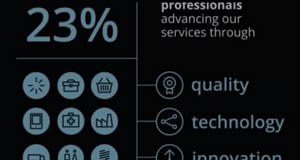Introduction
Welcome to our Impact Report – the story of our firm over FY16. The report demonstrates how our 17,000 people are putting our shared purpose into action – making an impact that matters for our clients, our people and society.

This has been a year of great change for the UK. And while the decision to leave the European Union (EU) sparked significant uncertainty, I'm confident the country is in a strong position to navigate this time of upheaval, and can retain its reputation as an attractive place for international talent and investment.
I believe business must work with government to set a vision for a post-EU environment that is open, pro-growth and, crucially, delivers opportunity for all. The referendum demonstrated the breakdown in trust between the public and business, and shone a light on the lack of inclusive growth in our society. We have a role to play in supporting the needs of our communities across the country, and this should include a focus on how to tackle some of the biggest issues in the UK, such as education and skills, social mobility and productivity.
This year, we've seen increasing debate about the consequences of automation of the workplace. The UK can only fully profit from the benefits of such technological advances if it can shape a workforce with the right education and skills to adapt to a changing business landscape, ensuring innovation doesn't cause increasing division in society between the haves and have nots. We continue to work with schools across the country through our Access programme, providing young people with the skills they need to access a wide range of careers. We've also reformed our recruitment processes to address the need to find people with an aptitude for innovation and creativity, as well as confronting the issue of social mobility in the UK.
We must keep innovating, recognising the impact it can have on future growth and productivity.
Initiatives such as Access show how our firm can make a difference beyond just profits, and this year we encouraged our people to share stories of their impact through our inaugural Impact Awards. The 149 case studies submitted demonstrate the breadth and reach of the firm as told by our people. You'll see some of those stories in this report, such as how we've used automation to innovate our audit practice, helped an NHS Trust come out of financial breach, and supported charities in creating long-term strategies to help the most vulnerable in society. Not only did the Awards uncover these great stories, they were also an opportunity to help our people better understand our purpose and how they bring it to life in their daily work.
As a firm, we must keep innovating, recognising the significant impact it can have on future growth and productivity. We've invested in developing our capability across emerging business disruptors, such as blockchain, crowdsourcing and robotics, working to ensure we can help our clients position their businesses for future growth. We're also supporting entrepreneurs, launching Propel, a cloud-based accounting service to help start-ups grow. We funded Propel through our £25 million Innovation Investments scheme, which encourages our employees to turn start-up ideas into businesses, and helps embed a culture of innovation in our firm.
I'm proud of the many things we've achieved in FY16, but to continue to thrive in an increasingly competitive landscape, we must remain focused on serving clients globally – providing a seamless cross-border experience. This will be particularly significant given the UK's decision to leave the EU. We want to ensure that our country continues to maintain not only a competitive, but also a welcoming environment for talent and businesses.
I'm committed to making the choices that will secure a bold and bright future for our firm; by providing trust in the capital markets, supporting inclusive growth and building skills, we can continue to make an impact that matters.

David Sproul
Senior Partner and Chief Executive
-
Our talent pool included 17,000 people in FY16.
-
We paid £396m to HMRC – which includes corporation tax, income tax and national insurance.
-
In 3 years, we raised £2.65m for Alzheimer's Society, Prostate Cancer UK and Mind, as well as providing 7,000 hours of pro bono support.
-
We support clients in developing their leaders by offering Transition Labs, with 115 C-suite executives and NEDs participating in FY16.
Report chapters
Providing trust
Instilling trust and confidence in the capital markets through our audit and tax work.
Building skills
Investing in education and skills, fostering diversity and social mobility.
Providing trust
Helping to maintain trust in the capital markets by delivering high-quality audits and ensuring integrity and transparency in our tax work.
Areas of focus
Audit and the impact of Brexit
The near-term effects of the EU referendum will be a key focus for auditors. We have worked with clients to help them understand the potential consequences of Brexit by considering how principal risks could affect their business. For example, we've looked at whether key accounting judgements and areas of estimation need to change, and how volatility might affect assumptions in developing forecasts. We're also helping clients to understand whether additional disclosures are needed to help reassure investors and steady the capital markets in this time of uncertainty.

As the effects of the Leave vote on capital markets and the economy unfold, and the political timetable becomes clearer, we will make sure clients are aware of the implications for their business – including reporting requirements.
Investment Association Awards
Deloitte won three accolades at this year's Investment Association Auditor Reporting awards. The firm's audit report for Marks & Spencer Group won the award for overall FTSE 100 audit report, while the audit report for Direct Line Insurance was awarded Best Disclosure of Materiality in the FTSE 100. Finally, the audit report for Intermediate Capital Group won the award for disclosures of risk of material misstatement for other premium listed companies. The Investment Association Auditor Reporting awards recognise excellence in auditor reporting, highlighting those reports that are the most informative and clear to investors.
Related case studies
Risk management: staying one step ahead
In response to regulatory changes and stakeholder feedback, we have introduced a number of new initiatives for companies to stay ahead in their reporting responsibilities.
Our Stakeholder Forum provides an opportunity for investors, regulators, professional bodies, government and audit committee chairs to tell us what matters most to them. At this year's forum, there was a call for more commentary and insight from auditors into the identified risks affecting their clients.
For example, enhanced auditor reporting, introduced in 2013, contributed to better disclosure of the auditor's approach to testing areas of significant risk – increasing the transparency and effectiveness of the audit. To move this forward, we developed a special assurance report – a snapshot of key risks that may affect a company's financial statements. The report is published at the same time as the preliminary announcement, bridging the investor communications gap between the release of the preliminary announcement and the annual report.
We've also developed a tool for companies to diagnose the effectiveness of their governance framework. It helps them see if there are inconsistencies, overlaps or gaps in governance processes that could lead to a crisis, damage their reputation, or affect strategic and operational performance.

Case study
CBEST: Putting cyber defences to the test
We've helped some of the largest banks and insurers in the world assess their cyber risks and improve their attack and detection capabilities.

Case study
Nursing an NHS Trust back to health
Delivering savings to help Dudley NHS Trust come out of financial breach.
Robots and automation: the audit of the future is now
Our research shows 70 per cent of users of financial statements and 76 per cent of audit committees believe that auditors should use advanced technologies more extensively.
We are exploring and developing the latest analytical, automation and cognitive technologies to enhance what we do and how we do it. For example, our Spotlight analytics tool – used with over 1,200 clients already – generates valuable insight for our audit teams by analysing billions of audit records every year. Spotlight and other elements of our bespoke analytics solutions are increasingly being used in other areas of audit testing. This paves the way to 100 per cent testing of populations, and a consequential increase in assurance. We are also running pilots using artificial intelligence and robotics as we work towards the audit of the future.

These tools form an important part of our audit-quality agenda. They allow us to review an entire population of data rather than take a small sample, and increase the accuracy of results, improving our ability to quantify the impact of errors in the financial statements. Advances in technology are allowing our people to focus on analysing the outliers and the items requiring judgement, rather than manually testing items individually, improving the quality as well as the efficiency of our audit delivery.
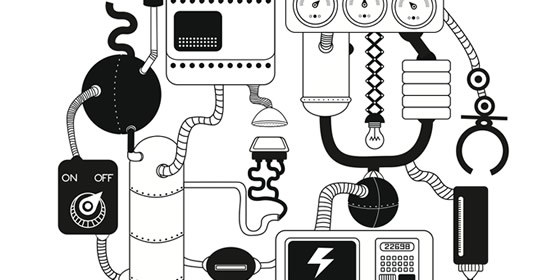
Case study
Audit automation: freeing up time to focus on what matters
Our audit automation tool shaves days off repetitive tasks, freeing up time to add insight and quality to our audits.

Case study
Brewery to bar: innovation in Diageo's supply chain
Helping Diageo transform its supply chain, to serve customers across 100 countries.
The tax system in FY16: navigating complexity
This year has been dominated by further changes to tax laws, international tax treaties and methodologies on the treatment of tax. The UK is at the forefront of legislating the agreed actions from the G20/OECD Base Erosion and Profit Shifting project (BEPS)1, which has already led to different reporting requirements – in terms of what's required by the tax authorities, and what companies need to release in the public domain. The Budget in March 2016 has brought major changes for employers and individuals, with important modifications in the treatment of property, non-domiciled individuals, travel and subsistence costs paid by certain employers, as well as a widening of the employment tax base.
In FY16 alone, our Tax Policy Group contributed to over 60 HMRC, EU and OECD consultations to inform the practical implications of these new policies. Our Tax business has also focused on helping clients navigate the complexity caused by these changing legal requirements. Our Tax team delivered more than 40 client webinars that were viewed 14,000 times. We have advised on required changes to company business models and corporate structures, and we have used our technology innovations to tackle clients' compliance challenges.
One example is the adoption of the Common Reporting Standard by the UK and 100 other countries, meaning banks, asset managers and insurance groups must be prepared to report the financial affairs of their overseas clients from 2017. In response, our Global Information Exchange team has worked with a leading data provider to develop a classification tool. This allows financial institutions to use publicly available information to determine whether their clients are reportable – without the need to contact them directly. By using the latest technology, combined with our tax expertise, institutions are able to significantly reduce the time and resources taken in classifying their clients, and have the confidence that they're playing their part in improving tax transparency by providing the correct information to tax authorities. Since launch, this tool has already provided well in excess of 100,000 customer classifications to a variety of financial institutions.
And the impact of Brexit? The UK's vote to leave the EU could well create challenges down the line in the areas of immigration, withholding taxes, customs duty and VAT, but in the short term it will have little immediate impact on indirect or direct taxes or employee mobility. When the exit negotiations are complete in a couple of years' time, the bigger issues are likely to arise from changes to the supply chain needed to guarantee market access.
- 1 BEPS refers to tax planning strategies that exploit gaps and mismatches in tax rules to artificially shift profits to low- or no-tax locations where there's little or no economic activity, resulting in little or no overall corporate tax being paid.
Related case studies

Case study
Making data count in global mobility
Data analytics helps Rolls-Royce ensure tax and immigration compliance across the globe.

Case study
Technology helps answer call for greater tax transparency
Using technology with Dun & Bradstreet to help companies fulfil new reporting obligations.
Investing in the next generation of tax advisers
The changes in the tax system and the increasing use of technology mean tax advisers must continually evolve their skills. In September 2015, we launched our Tax Analyst Academy – a three-week residential training programme focused on helping analysts transfer learning to a practical client and project environment. The academy, the precursor to our two-year analyst development programme, builds both soft and technical skills through an immersive and highly interactive experience. It also establishes a strong network across our Tax business and gives our analysts the opportunity to work on complex client problems, putting an emphasis on collaboration and innovation.

Case study
The perfect start to your tax career?
Tax Academy analysts give their verdicts on the three-week training programme.

Case study
TMT Predictions Schools Challenge: fun and games tackle the skills shortage
Our TMT Predictions Schools Challenge aims to get young people fired up about a career in science, technology, engineering and maths.
Innovation in tax
The investment in our new recruits and ongoing training for our people will contribute to the quality of our service and our ability to bring innovation to our Tax business. We have a dedicated innovation team who work on projects across compliance, business tax and global mobility. For example, we provided both the technology and tax insight that powered this year's BBC Budget calculator. We were able to help answer 17.3 million queries over 2 days from people looking to find out what the Budget changes meant for their personal tax situation.

During FY17, we'll be looking at tax innovation projects, including the use of robotics in our compliance services, and cognitive computing in advisory engagements, to allow our practioners to access and interpret the important aspects of huge data sets. We will also be crowdsourcing ideas for new delivery models.

Case study
Technology helps answer call for greater tax transparency
Using technology with Dun & Bradstreet to help companies fulfil new reporting obligations.

Case study
Confidence in tax compliance
Innovative use of data analytics to automate compliance processes.
Highlights from the year
-
Our Spotlight Analytics tool has tested over 2.4bn audit journals to date.
-
Our Tax Policy Group contributed to over 60 HMRC, EU and OECD consultations.
-
Deloitte UK signed external audit reports for more than 15,500 entities.
-
We provided both the technology and tax insight that powered this year's BBC Budget calculator. 17.3m queries answered over 2 days.
-
We filed more than 21,600 UK corporate, VAT and personal tax returns.
-
We monitored over 4m messages and 77,000 calls for a large European bank, totalling in excess of 7,000 hours of talk time.
Supporting inclusive growth
Promoting investment in the UK, supporting businesses and charities to expand and be prepared to take advantage of the best opportunities.
Areas of focus
Navigating the impact of Brexit
June's decision to leave the EU has resulted in delays to business investment and expansion decisions. In the run up to and after the vote, we conducted referendum "war games" for our clients, with Deloitte experts across tax, trade, regulation, strategy and legal helping them understand and plan for the associated risks and opportunities.
We're now supporting clients in navigating through some potentially difficult months ahead, helping them understand how the result could affect them, what threats and opportunities they face, and how they should adapt in an uncertain and shifting economic, political and regulatory environment.

In spite of this uncertainty, business leaders are focused on driving growth in the long term. A drop in corporate confidence has seen a reduction in M&A activity since the third quarter of FY16, but companies are still looking for opportunities to expand both in the UK and globally. Over FY16, our financial advisory teams advised on a range of deals, from the acquisition of one of the world's most recognisable newspaper brands to the creation of the world's second-largest non-state oil group.
And, as more companies look to operate on a global scale, we're supporting the government's Exporting is GREAT campaign, and its efforts to get 100,000 additional companies exporting by 2020.

Case study
Brewery to bar: innovation in Diageo's supply chain
Helping Diageo transform its supply chain, to serve customers across 100 countries.
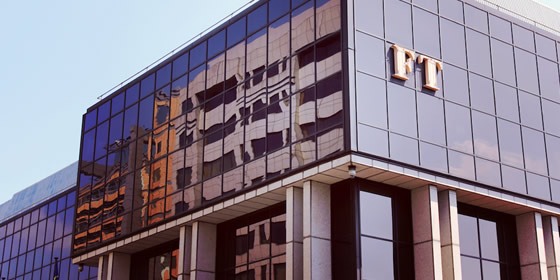
Supporting entrepreneurs
As well as working with some of the UK's largest and most influential companies, we also support the business leaders of the future. Entrepreneurs play a crucial role in creating wealth and jobs, and changing the way we live and work. Our research has shown that targeted help for early stage female entrepreneurs could provide a £100 billion boost to the UK economy by 2025.

We're playing a key role in developing the UK's entrepreneurial culture. Since 2015, we've invested in 30 disruptive business propositions, backing new data analytics companies in insurance, life sciences and the public sector. Of these companies, 20 have been ideas developed by our own people, and we continue to invest in helping our professionals create and run our businesses of the future. One example is Propel by Deloitte, launched in June 2016. Designed specifically for ambitious start-ups and small and medium-sized enterprises, Propel aims to support these businesses as they grow, providing a real-time accounting and business analytics subscription service.
Yet the continued growth of new businesses – particularly in the technology sector – is at threat from a lack of relevant skills. Deloitte's Kick-Start a Start-Up programme is a secondment scheme designed to connect our people with the start-up community. We've engaged with some of today's most disruptive start-ups across a variety of disciplines from fintech (financial technology) to edtech (educational technology). Our secondments are helping business accelerator Tech City by supporting the next generation of leaders to scale their business in line with their ambitions. For example, this year we seconded one of our technology analysts to Collider, an early-stage technology accelerator, to advise on issues such as cash flow, start-up due diligence and making investments.
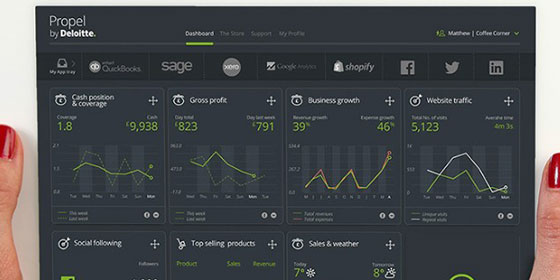
Case study
A start-up for start-ups? Innovation Investments funds Propel
Propel is a real-time accounting and analytics service designed to help start-ups and SMEs grow.

Case study
The beautiful game, serious business
Deloitte Social Impact helps social pioneer Vi-Ability create a Football CEO app.
Business of the future: the role of the robot
In a business landscape of low inflation and rising costs, companies must find new ways to grow – whether that's through M&A, partnerships or increased investment in technology. Our automation research has shown technology will transform every sector of the UK economy over the next two decades. While this transformation means millions of jobs are at risk of being replaced by robots, each wave of new technology also contributes to significantly higher job creation – particularly in sectors such as financial services and technology, and the creative and caring professions.
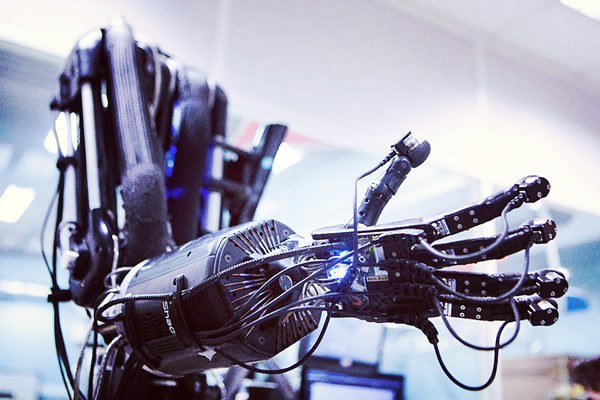
There are questions about whether future growth can be inclusive or if automation will act as a barrier to opportunities for the younger generation. The UK can only fully profit from the benefits of technological advances by shaping a workforce with the right education and skills. We have discussed the findings of our automation research with advisers from No 10, the Treasury and the Business, Energy & Industrial Strategy department, and have given evidence to the House of Commons Science and Technology Commission.

Case study
45,000 miles of pipes, 5.9 million homes: mapping SGN's gas network
Helping SGN plan the maintenance of its natural gas pipeline across the UK.

Case study
Switching on the Internet of Things with Philips Lighting
We're working with Philips Lighting to create a connected retail experience, using the Internet of Things to merge the online and physical shopping experience.
Disruption and innovation
Automation and disruptive innovation have been behind many of the recent transformations in our daily lives. In our role as a trusted adviser to business, we explore emerging disruptors such as blockchain2, robotics, crowdsourcing and artificial intelligence, identifying how these might work best for our clients, and sharing our experiences and perspectives with the wider market.
By helping clients take advantage of new technology, we're improving their business processes, finding new customers and re-designing the customer experience. This year, we set up a blockchain lab to help our clients build new applications and test new concepts. We recently announced the development of a Smart Identity platform, which will allow users to create a universal digital identity powered by blockchain technology. Smart Identity allows customers and organisations to have complete control over their digital identity, creating an account containing the information and credentials needed for trusted digital interactions and transactions.
We also launched our enterprise crowdsourcing capability, Deloitte Pixel – a unique methodology aiming to grow a 'crowd of crowds' to help solve our clients' problems. It breaks large problems into smaller pieces – pixels – and invites individuals to contribute based on their specific skills, resulting in faster, better and often less-costly outcomes. This methodology allows our teams and clients to collaborate to develop new products or ideas, and is already being used to address a variety of issues, from market insight to digital design and development, customer engagement, operations, and talent strategy.
We've used crowdsourcing to help the British Olympic Association find new sources of revenue, while our robotics team has been working with a leading challenger bank to improve its complaint-handling operations.
- 2 A set of technologies that support distributed ledgers and virtual currencies.
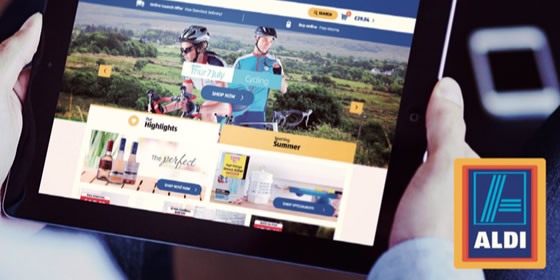
Case study
There's an app for that: launching ALDI's ecommerce business
Delivering an online platform for Aldi's ecommerce business.
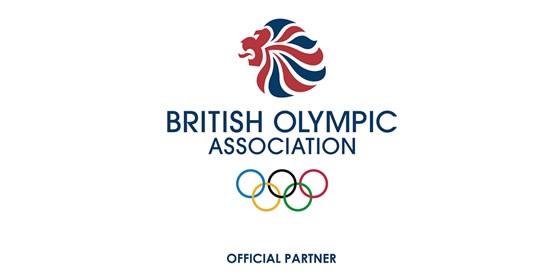
Case study
Wisdom of the crowd? Finding ways to develop the BOA’s long-term ambitions
Using the power of crowdsourcing to find new sources of revenue for the British Olympic Association.
The role of charities and social enterprise
If growth is to be sustainable, it must also be inclusive – providing equality of opportunity for all parts of society. Our work with our National Charity Partners (NCPs) has demonstrated that by providing support that goes beyond just raising money, business can play a vital role in helping charities and social enterprises to grow their organisations in a robust and durable way.
During our three-year partnership with Mind, Alzheimer's Society and Prostate Cancer UK, we've provided 7,000 hours of pro bono support. This includes creating a five-year national dementia strategy, mapping prostate cancer across the UK to help reach 300,000 men most at risk, and helping Mind build the capacity to answer over 18,000 helpline calls. Our hope is that such resources will help provide a lasting legacy for these organisations and their beneficiaries, expanding their scale and social impact.
We have raised £2.65 million for our NCPs, and FY16 saw our largest-ever fundraiser take place – the Deloitte Charity Challenge. Our people participated in one of four challenges across four different continents, including trekking Kilimanjaro; a rafting, hiking and biking challenge in Borneo; a walk across the Sierra Nevada; and an arduous climb up the world's most active volcano in Ecuador.
We've seen the value that our pro bono programmes bring to our NCPs, and have therefore looked to scale and grow our support for social organisations. We're developing a new business model through which we'll be able to offer our services at discounted rates to the social sector, reinvesting any profit made back into the social mission. Deloitte Social Impact is still in its early phases, but has already delivered a number of innovative and exciting projects that are helping the social sector tackle the issue of employability.
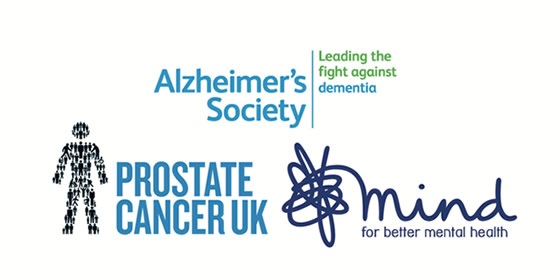
Case study
Creating a legacy with our National Charity Partners
Raising £2.6m for Mind, Alzheimer's Society and Prostate Cancer UK over our 3 year partnership.
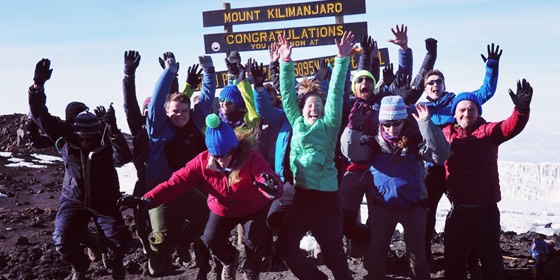
Case study
Deloitte Charity Challenge
4 challenges, 1 ambition: to raise £1m for our charity partners.
Public sector's role in inclusive growth
The public sector plays an important role in fostering inclusive growth, and we've been working across transport, housing, infrastructure and health to help mitigate the impact of far-reaching austerity measures. The sector is now exploiting digital technologies to operate more efficiently and improve its interaction with customers.

Improving access to transport and housing can have a direct impact on the economy and the sustainability of growth. Several of our projects this year support that agenda. For example, we've designed a new operating model for London's underground network, helping Transport for London become 'Fit for the Future' in the way it manages its stations. And we've worked with the National Housing Federation, delivering millions in savings for housing associations that provide affordable housing to over 5.7 million people in the UK. These efficiencies will provide long-term benefits for the sector and support wider regeneration across the UK.

Case study
Making London Underground fit for the future
Helping TFL create a new customer-focused operating model for tube stations.

Case study
Safe as houses? The UK's affordable housing crisis
Helping housing associations build the financial resilience to provide more affordable homes.
Highlights from the year
-
46,800 volunteering hours provided to charities and community organisations.
-
We advised on 43% of Main Market IPOs in FY16.*
-
Over 900 of our people participated in 63 community day projects.
-
Seven Management Consultancies Association awards.
-
Changing a 150-year old organisation that carries 4m passengers every day: making TfL Fit for the Future.
-
With our help, Nuffield Health hospitals now use 10% less energy, and its gyms 8%.
- * Premium Listings by trading companies only (i.e. investment companies, venture capital trusts, transfers from other markets, cash shells etc. have been excluded).
Building skills
Investing in the skills of our people and working to improve diversity and break down the barriers to social mobility.
Areas of focus
Investing in education and training
The scale and scope of projects we tackle for clients requires a broad range of skills and experience. We're investing in learning and development opportunities for our people (nearly £35 million in FY16), and making sure we provide multiple routes for them to succeed – whether that's by changing the way we recruit, offering flexible career paths or improving global mobility within Deloitte.
We've seen increasing demand for skills in areas such as technology, data analytics and cyber security. We're working with education providers to help the UK's workforce develop the skills needed in a changing business world. For example, our people are helping teach the newly developed cyber security MSc from De Montfort University in Leicester; a degree that combines technology with the role of linguistics, psychology and sociology in dealing with new cyber challenges. Students on the course get to study real-life cyber issues, as well as a chance of a placement with our firm.
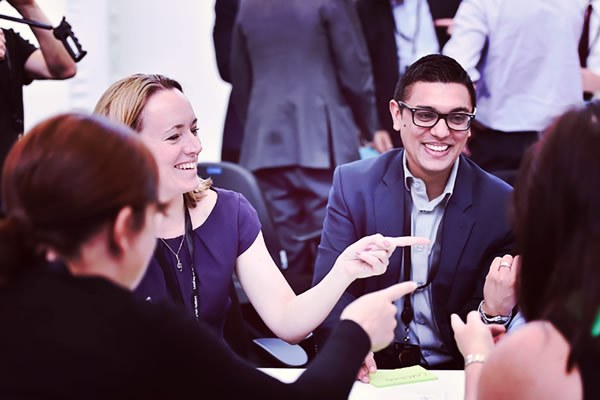
In Northern Ireland, we're working with Ulster University to offer school leavers full-time employment together with a fully funded BSc in Business Technology. Such initiatives give students the chance of a high-quality education and employment, regardless of their background; they also enable us to tap into a much wider and diverse pool of talent. This year also sees the launch of Ada – the National College for Digital Skills – created to support students' progress into computing-related roles, and to address the digital skills shortage facing businesses in the UK. We've played an instrumental role in the development of the college, including providing a secondee from our Deloitte Digital team.
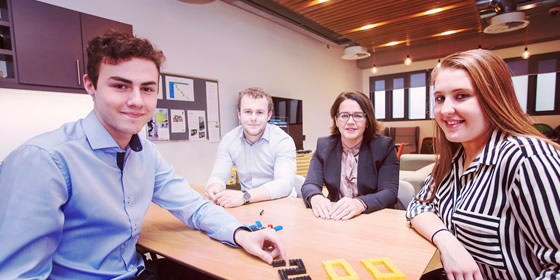
Case study
Brightstarts: education and employment for Belfast students
Partnerships with Ulster University and Belfast Metropolitan College offering students a high quality education – regardless of background.
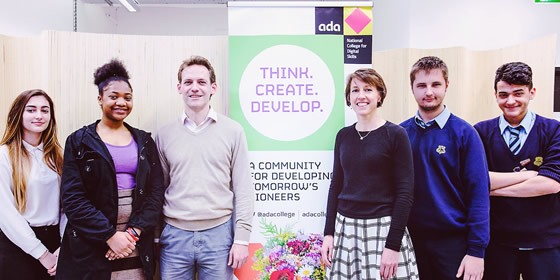
Case study
ADA launch to tackle digital skills shortage
Deloitte alumnus Tom Fogden describes setting up ADA, the National College for Digital Skills, as part of a drive to address major digital skills shortages in the UK.
Social mobility: raising aspirations
The issues of employability and skills development have long been a core focus for our firm. Our Deloitte Access programme, delivered in collaboration with Teach First, gives young people from disadvantaged backgrounds the ambition, skills and opportunities they need to access professional careers. We've continued to grow the programme this year, supporting 17 schools across the UK through 1,200 volunteers who work with more than 4,500 pupils in low-income communities.

Improving social mobility is one of the UK's biggest challenges and, all too often, career paths are determined by a person's social or economic background rather than talent and potential. To help tackle this, we must remove the perception that some careers are a closed shop. We are one of the government's 11 Social Mobility Business Compact Champions, and in September 2015 held our first social mobility week. The aim was to create debate about the role business can play in breaking down the barriers of social mobility.
In parallel, we announced major changes to our recruitment process, introducing blind recruitment and academic contextualisation – allowing our recruiters to make more informed choices about candidates by considering the context in which their academic achievements have been gained.
Reforming our recruitment process has been a key part of both addressing the societal challenge of social mobility and recognising the need for our firm to access a broad range of talent. To serve our clients, we need people who think differently, who come from a variety of backgrounds and who bring a range of perspectives and experience. We're putting in place better ways to collect data on our workforce, and we were one of the largest UK firms to publish the socio-economic and educational background of our partners and people. We hope this can help demonstrate that a career at our firm is open to all.
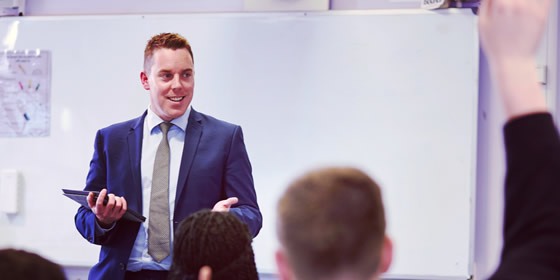
Case study
8m students, 10,000 years of learning: How an accountant used maths to turn his dream of helping disadvantaged children into reality
Deloitte alumnus Colin Hegarty describes his journey from chartered accountant to award-winning maths teacher.

Case study
TMT Predictions Schools Challenge: fun and games tackle the skills shortage
Our TMT Predictions Schools Challenge aims to get young people fired up about a career in science, technology, engineering and maths.
Increasing gender diversity
Gender diversity is a priority for our firm, and we've made good progress in FY16 on ways to attract, retain and develop our female staff. We're committed to our target that 25 per cent of our partners will be women by 2020. This year, 24 women were promoted to partner (30 per cent of the total partner promotions), bringing our percentage of female partners to 17.6 per cent, as of 1 June 20163. We recognise, however, that we still have much to do.
We were one of the first firms to report our gender pay gap, which stands at 16.8 per cent4 compared to the national average of 19.2 per cent5. When looking across the organisation as a whole, the pay gap between male and female employees at each grade is significantly lower, at 1.8 per cent.
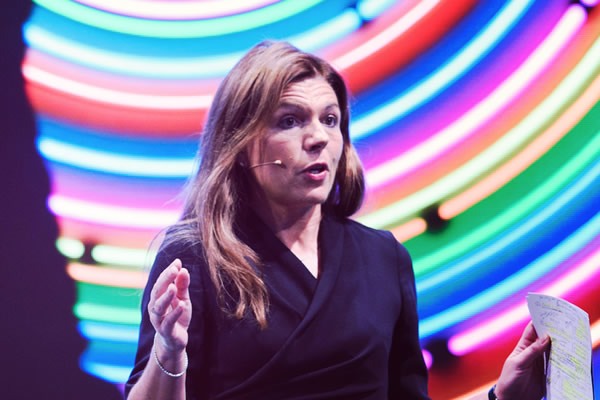
Our use of concrete data to form our gender-equality strategy was recognised by the United Nations this year, with our CEO David Sproul awarded the Business Case for Action Award. The UN referenced our decision to voluntarily publish our pay gap, as well as David's role in championing and supporting our Women in Leadership and Respect & Inclusion action plans. Our Managing Partner for Talent, Emma Codd, was also recognised this year, winning Women in the City's Woman of Achievement Award. The award celebrates those who actively promote and encourage the progress of women above and beyond their everyday jobs; and the judges recognised the significant strides Emma has overseen in the talent agenda at our firm.
As part of our Women in Leadership plan, we were the first professional services firm to launch a Return to Work programme, aimed at helping women who've been out of the workforce for an extended period to return to the office. In addition, our Working Parents Transitions Programme, which provides coaching for those returning to Deloitte from maternity, paternity and adoption leave, has received overwhelmingly positive feedback from those who've taken part. The programme is coming to the end of its first 12 months, and we have already seen a significant reduction in the number of women leaving us within a year of returning from maternity leave.
Although such actions have been crucial in moving the bar in relation to gender diversity, we also believe that the support and contribution of men is critical to achieving long-term change. To coincide with the legislation on Shared Parental Leave (SPL), we introduced an enhanced rate of SPL for fathers, partners and co-adopters. In the first year of SPL, we've seen 12 per cent of our male parents take up the option. The Top Employers for Working Families Special Awards, which celebrate employers that support the work-life balance of their employees, recognised Deloitte as a leading organisation in this area. We also received the award for Best Innovation for our WorkAgility Time Out programme6.
We continue to support agile working, helping our people to balance a successful career with their commitments outside work. To date, 379 of our people have taken part in our Time Out programme, and a recent survey identified that over 72 per cent of respondents feel encouraged to work in an agile way.
- 3 The percentage of female partners to 31 May 2016 was 16.4 per cent.
- 4 Calculation based on annual salary alone and does not include bonus payments. The government is reviewing the method of calculating gender pay gap and we will align our methodology with any revised guidelines.
- 5 Based on Office for National Statistics calculation.
- 6 Time Out allows our people to request a four week block of unpaid extra leave each year.
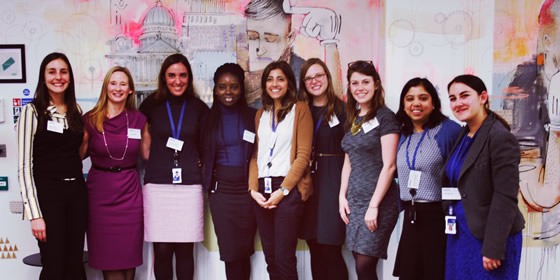
Case study
Dispelling myths, raising awareness – how Women in Technology is encouraging the next generation of tech talent
Our Women in Technology network encourages more women to pursue careers in technology by working with schools.
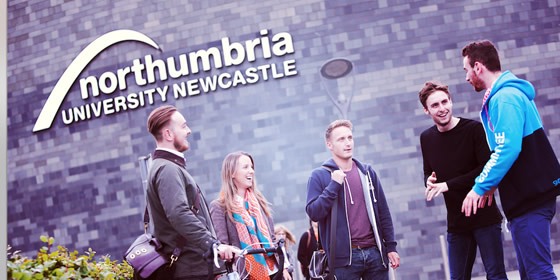
Case study
Transforming the Student Experience at Northumbria University
Modernising and improving the way Northumbria engages with students, overhauling services across the campuses.
Fostering an inclusive environment
We believe an inclusive environment that embraces difference is vital to our firm's success, both in terms of attracting and retaining the best people and enabling us to provide innovative solutions to our clients' most complex issues. True diversity can only be achieved where the working environment is inclusive and underpinned by respect.
A key pillar of our Respect & Inclusion (R&I) action plan is education, and we've set up an ongoing programme of learning for all our people, making sure they understand not only the firm's expectations but also the consequences of unacceptable behaviour. During the past year, over 1,700 of our partners and directors have taken part in R&I leadership sessions. In addition, all our people must complete online R&I training, and our recruiters undertake unconscious-bias training. In FY16, we introduced the role of R&I Advisers, comprising senior leaders who've been trained to provide confidential, one-to-one support to those who would like help in addressing any R&I issues they have encountered.
Deloitte has ten diversity networks that connect our people across gender, race, religion, sexual orientation and disability, as well as parenting responsibilities. With around 4,000 members, these groups create a sense of community and belonging, help us build our external client relationships, and support the attraction and retention of a diverse workforce. Our ten networks come together regularly to share their plans, discussing ideas on how to increase interaction between the groups and colleagues across the firm.
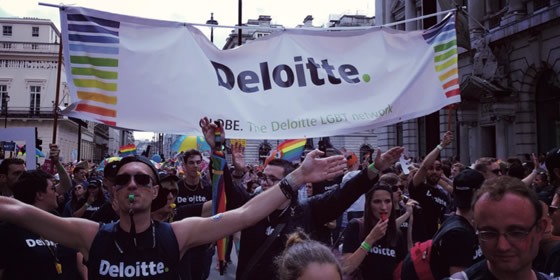
Case study
GLOBE: valuing diversity in business
Our GLOBE network is having a significant impact on Deloitte's culture, helping everyone feel able to be themselves at work.

Case study
Communications planning for Modern Muse
Inspiring the next generation of female business leaders and entrepreneurs.
One Million Futures
We're always looking to evolve what we do to ensure we have maximum societal impact across all areas of our business. With this in mind, we're launching a new strategy to focus our activity on a particular theme that matters most to our people, our clients and the society in which we work: education and skills.
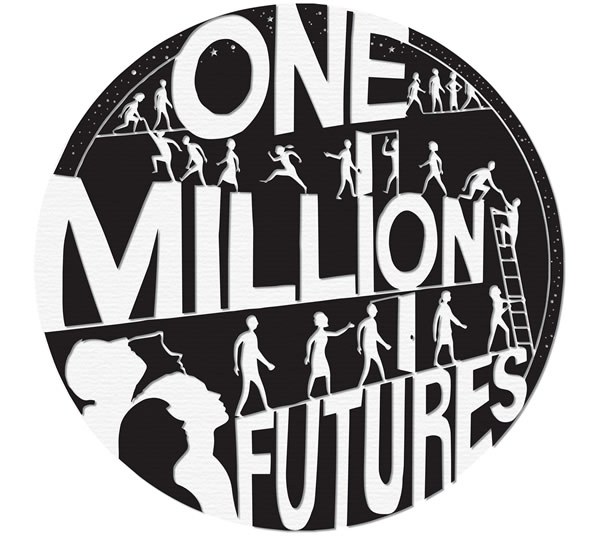
Our One Million Futures programme aims to inspire a million people; whether in the classroom, the workplace or the boardroom. We will use the strength of the Deloitte network to raise aspirations, build skills and develop leaders. We believe it's not where you're from that's important; it's where you're going. We want to overcome barriers to education and employment, giving individuals the skills and opportunities to succeed.

Case study
Deloitte Access: opportunity and ambition for students
Giving young people at Samuel Ryder Academy the ambition and skills they need for future careers.
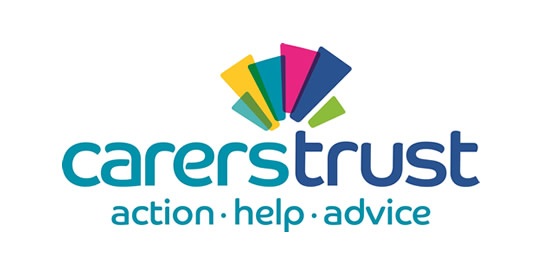
Case study
Carers Trust: improving job prospects of young carers
Sheila Newbury talks about how our Community Day programme has supported over 1,000 employability projects over the past 10 years.
Highlights from the year
-
Our Respect & Inclusion film Ask Yourself was viewed more than 55,000 times on YouTube.
-
Deloitte alumnus Colin Hegarty made 2,000 maths videos in 2 years, used by over 8m students in over 200 territories across the globe.
-
Over 800 people signed up to our LGBT Allies Programme.
-
We hired over 100 school leavers via our apprenticeship scheme, BrightStart.
-
Deloitte ASPIRE, a new work experience programme, took on 141 school students, all of whom were eligible for free school meals or would be first in family to go to university.
-
Deloitte Access supported over 4,500 students in 17 UK schools.
Metrics
Alongside our broader impact and contribution sit the key metrics through which we measure our ongoing performance.
Leadership and governance
Learn more about the leadership and governance of Deloitte LLP.
